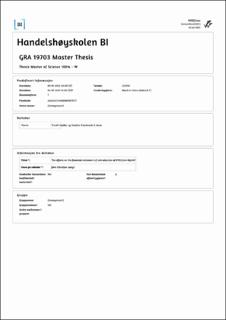| dc.description.abstract | Previous research has been done on the effects of the mandatory transition to International Financial Reporting Standard for listed companies in the EU/EEA in 2005. This thesis wants to provide an updated view of the transition effects in Norway, focusing on where in the financial statement the effect of transitioning from Norwegian Generally Accepted Accounting Principles to International Financial Reportin Standard occurs, how financial metrics are affected, how significant the effect is, and if there are differences between industries. Using data provided by Brønnøysundregisteret, we have an overview of the choice of the accounting standard for all organization numbers from 2005 to 2021. We collected reconciliation statements from companies transitioning to International Financial Reporting Standard in 2020 and 2021 using this information. To test the significance of the results, we applied the Wilcoxon test. Our findings show that the change in non-current liability, operating profit, net financial income, and results are statistically significant at conventional levels. The findings are essential from the user's perspective, as they contribute to more knowledge about whether and when to consider reporting language. | en_US |
